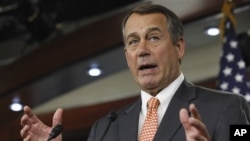The U.S. House of Representatives is engaged in a marathon debate on a government funding bill that would cut up to $100 billion off of President Barack Obama's federal budget for the current fiscal year. The Republican-led House is expected to pass the spending bill late Thursday or Friday, but that would just be the first step in a high-stakes battle between Democrats and Republicans over the role of government and spending priorities.
The U.S. House of Representatives began debating the spending bill Tuesday, along with the 583 amendments lawmakers have proposed, most of them from Republicans trying to cut specific government programs, including funding for the president's health care reform legislation passed last year and funding for public broadcasting.
Republican House Speaker John Boehner laid out his plans at a news conference Thursday. "As part of our effort to liberate our economy from the shackles of out of control spending, the House will soon vote to cut discretionary spending by over $100 billion over the last seven months of this fiscal year," he said.
Democrats call the House Republican's proposed cuts "reckless", saying that will hurt women, children and the elderly most of all by cutting social programs, such as heating subsidies for low-income Americans. Democrats say the cuts would also jeopardize U.S. national security interest by cutting foreign aid. The Democratic-controlled Senate is virtually certain not to pass the cuts proposed by the House, and President Obama has made clear he would veto such large spending cuts if they ever got to his desk.
But House Republicans also seem to be digging in on their position. Speaker Boehner made clear Thursday that Republicans will not support a short-term funding measure to fund the government at current spending levels to keep the government from shutting down when the current funding measure expires on March 4, only 15 days away.
"When we say we are going to cut spending, read my lips. We are going to cut spending."
Senate Democratic Majority Leader Harry Reid wasted no time in issuing an angry rebuttal to Boehner. "We are terribly disappointed that Speaker Boehner cannot control the votes in his caucus to prevent a shutdown of government. And now he is resorting to threats to do just that, without any negotiations. That is not permissible, we will not stand for that. He is wrong," he said.
After the House passes its spending bill, it is set to go in recess next week, and so is the Senate. When the House and Senate return they will only have a few days to find some sort of comprimise on a temporary spending bill to prevent the federal government from shutting down on March 5. Some analysts say a repeat is looking more likely of the late 1995-early 1996 government shutdown under then Democratic President Bill Clinton and then-Republican House Speaker Newt Gingrich.
Analysts say Americans did not like that government shutdown, which meant that government retirement checks did not go out and other basic government services were interrupted. Most seemed to blame it on Republicans, helping Bill Clinton to get re-elected. It is not yet clear whether Washington is in for a similar roller-coaster ride this time around, but it has been a week of long days and nights on Capitol Hill.
US House To Vote on Major Cuts to Federal Spending




